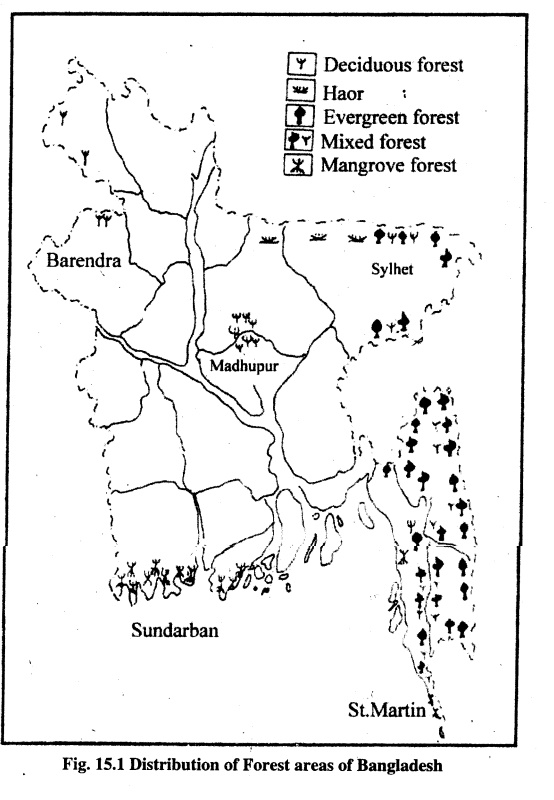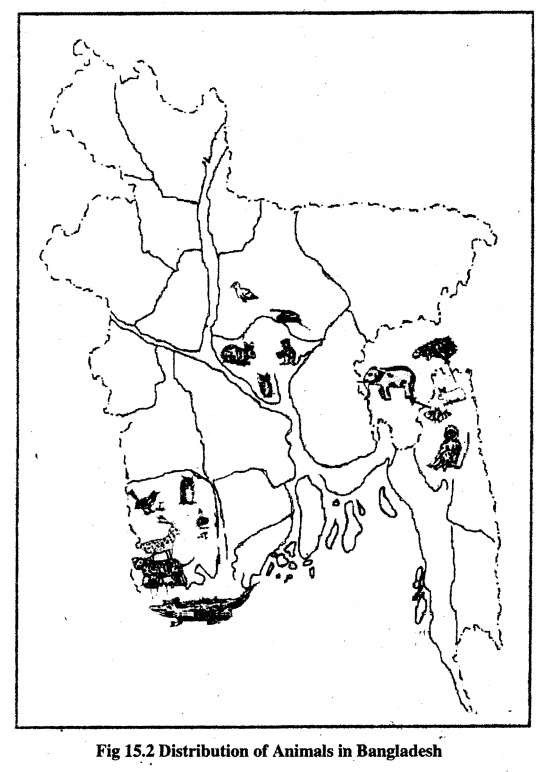Chapter: Biology: Natural Diversities of Bangladesh-Distribution of Plants and Animals
Pleistocene uplands
Pleistocene uplands : During Pleistocene era (25,000 years ago), many regions ofthe world
became raised and formed uplands. These regions are called Pleistocene uplands.
In Bangladesh, Barendro region, Modhupur Gorh and Lalmai hills are parts of
these uplands. The environmental characteristics and flora and fauna of these
regions are almost similar. But the large area of Shaalbon is noticeable.
A.
Barendro : The region
occupies the north-western region of Bangladeshincluding Chapainowabganj,
Rajshahi, Nowgaon, Jaipurhat and part of Dinajpur. The total area of this region is about 9300 square kilometers
and situated at about 6 -12 meters (20-40 feet) above sea level. In some area
of this region the soil is terraced in steps.
B.
Modhupur Gorh : Modhupur
Gorh includes Modhupur of Tangail district,Jamalpur, Gazipur, and parts of
Dhaka and Narsingdi district. Total area of this land is about 4100-square
kilometers and situated at about 15 -30 meters (50 - 100 feet) above the sea
level. Long ago there was a continuous Shaalbon of 160 kilometers long from
Jamalpur to Dhaka. Now this forest is scattered into pieces. Though Chandra,
Rajendrapur or Bhawal is treated as separate forests but they are actually
parts of Modhupur forest. Brahmmaputra and Shitalakshma rivers separate the
eastern part of this forest from the main uplands. Egaro Sindhur, Shibpur, and
Monohardi thana and part of Sonargaon are part of this separated region.
C.
Lalmai Hills : Lalmai
Hills is situated near Comilla town and is about 14.5kilometers (9 miles) in
length and 0.8 -2.4 kilometers (0.5 -1.5 miles) in breadth. This is also a part
of Pleistocene uplands. This hill is about 6 -12 meter (20 -40 feet) in height.
Its highest pick is more than 46 meters (150 feet). Probably the name
'Moinamoti Shaalbon Bihar' originates because of the presence of Shaal forest
here.
Environmental
Characteristics : Soil of
Pleistocene uplands is unproductive,acidic and reddish or somewhere grayish.
Rainfall is insufficient, less than 2000 m.m. in a year. Climate is to some
extent extreme, high temperature in summer, dry winter, less humidity in air;
these are the characteristics of this region. This climatic condition has
contributed in creatingdeciduous forest. In Modhupur region forests develop in
elevated land (Chala) and places in between raised lands (Chala) are known as
BAID (Low land). In low land Areas paddy Is cultivated.

Major
Plants : One of the
characters of this upland is the presence of Shaalforest. Shaal forest is said
to be a deciduous forest. Because in winter all the trees of this forest become
leafless. In some places Shaalbon is also known as GAJARI GORH. 97% tree of
this forest is Shaal tree (Shorea
robusta) from which the name Shaal forest originates. Among other trees,
there are wild Chalta, Gachhi Gajari, Koroi, Kumvi, Gamari, Palash, Vela,
Bahera, Haritaki etc. Almost all of these are deciduous plants. Many jackfruit
trees have been cultivated in Modhupur and Bhawal region. Shaalbon has reduced
in large scale in Barendro region. There are still some Shaalbon in Phulpur and
Ghoraghat of Dinajpur and Dhamarhat of Nowgaon. The Shaalbon of Dhamarhat is a
continuous part of Indian Shaalbon. In Chapainowabganj and Godagari of
Rajshahi, Shaalbon is almost nil. Besides a very few Shaal trees, some
Pora-Shaal, Koroi, and Sinuri etc. are present here.

Major
Animals : Monkeys,
squirrel, jackals Langoor, several species ofsnakes, mongoose and different
kinds of birds are the major animals of Barendra region. In Modhupur region the
major animals are monkeys, entellus, jackals, lizards, woodpeckers, owls,
kites, mongoose, water monitor, squirrels and tree frogs. Once leopard and deer
were abundant here but now they are very scanty.
Related Topics